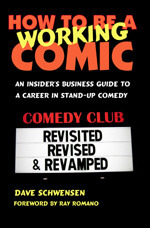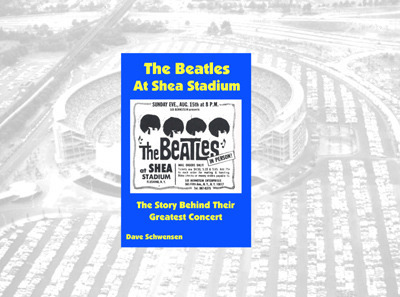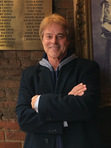Dave Schwensen's Blog, page 27
October 21, 2013
Know your audience
Hi Dave – I have one question. As a new comedian does my material have to be clean? – PC
Hey PC – Your question will sound familiar to more than a few readers because it comes up quite often. In fact I’ve probably hit on it at least twice in the last year. But you know what? New comedians ask because it’s important. And the best answer I can give you when deciding whether to work clean or dirty is to know your audience.
Who are you performing for?
Who are the people that paid good money to see you?
Where do you want to go career wise?
What markets do you want to play?
These are all questions every entertainer (not just comedians and humorous speakers) have to consider. As a creative artist (comedian, speaker, entertainer) who is your audience? And as a business person (successful creative artist), how can you build an audience for your creative endeavors?
The deal is that everyone has to start at the beginning. Since you specifically said “new comedian,” that’s what we’ll focus on. Speakers already know they have to work clean. If they don’t, then they’re not speaking much – if at all.
So… who is your audience?
When you’re just starting out in comedy it could be any demographic you can think of. And if you’re serious about this biz you need to understand the value of stage experience. You won’t become a working comic just sitting in your living room doing bits in front of your mirror or for the family dog. You must get in front of an audience and shape your material and delivery based on their response.

You’re killing me!!
If they laugh it works. If they don’t, then you need to make some changes. An audience will tell you, which is why you want to get on stage as often as possible.
So again I’ll ask – who is your audience?
Do they want clean or dirty material? Will you be able to pick and choose who you will be performing for? That will help determine what’s best for you.
I’ve worked with comedians who are Born Again Christians and I’ve worked with the most x-rated acts you’ve ever heard. It doesn’t bother me either way. I’m a coach and I’ll coach performers in whatever direction they want to go. And if you already know what direction that is, then find places to perform that will have an audience that will enjoy your material.
But regardless of what anyone else will tell you, there are also “rules” in comedy. The rules are made up by the people who hire comedians.
For instance, you can’t perform x-rated material on network television shows such as The Tonight Show, Letterman or Jimmy Kimmel Live. You can get away with a lot more than 30 years ago when Johnny Carson ruled late night, but these shows still have to deal with network standards and censors.
On cable television and satellite radio pretty much anything can be said. But it also depends on the show. I doubt The Howard Stern Show and The Disney Channel fight over guests from the same talent pool. But here’s another question to think about…
Are you ready to appear on either The Howard Stern Show or The Disney Channel?
You need to develop your act first to figure out who you are on stage and the only way to do that is through stage experience. And as a new comedian – who will appreciate (laugh at) your type of humor and material? What venues and markets do you eventually want to play?
My best advice is to know your audience.
 You can work x-rated if you want, but just be smart enough not to go on stage with your x-rated material if the audience is filled with grandparents taking their grand-kids out for a fun(ny) night of live entertainment. On the flip side, don’t expect to do your best Disney material in a late night dive bar in front of a beer fueled crowd of rednecks ticked-off that the bartender turned off the cage match wrestling extravaganza for your comedy show.
You can work x-rated if you want, but just be smart enough not to go on stage with your x-rated material if the audience is filled with grandparents taking their grand-kids out for a fun(ny) night of live entertainment. On the flip side, don’t expect to do your best Disney material in a late night dive bar in front of a beer fueled crowd of rednecks ticked-off that the bartender turned off the cage match wrestling extravaganza for your comedy show.
Get the picture?
A lot of experienced comedians can play to both audiences. Why? Because they have the experience AND material that can be “cleaned up” or “dirtied down” depending on the audience. In other words, their punch lines don’t get laughs simply because they contain the F-Bomb or other words that will get them banned from network television. They can go either way because the material is just as funny with or without them.
A great example of this are comics who work cruise ships.

Micky Mouse and
not Howard Stern
These comics need two different sets – family and adult. The family sets are performed during the before and after dinner shows. These are two separate shows since passengers are assigned one of two dinner times. One group is entertained in a large theater while the other group eats – and then they change places. As it says, these shows are for families. Later that night the same comics will do adult shows for – as it says – the adults in one of the lounges or bars.
These comics go from G-rated to X-rated within a couple hours.
Keep in mind I’m not asking anyone to change who they are on stage if it goes against who they want to be on stage. Yes, this is a business – but it’s also a creative business and a way to express your creativity. If your niche is x-rated, go for it. It’s the same with clean comedians. Just don’t go for it in front of the wrong audience. It’s really common sense when you think about it.
———————————————————————————
Sign up now for Dave’s free weekly newsletter and
receive 25% off the Amazon.com list price!
———————————————————————————
So to finally answer your question as a “new comedian,” I would suggest you work on writing funny material. And I’ll repeat: funny material. I’m talking about material that will stand up on it’s own and will be just as funny to an audience with or without a few gratuitous F-bombs and other choice words or expressions.
Practice and develop your talent as a writer. How would you deliver your set during an afternoon Rotary Club luncheon as opposed to at a late night dive bar? Better still – ask yourself which venue you prefer?
Wait a minute! I almost forgot to mention something…
Just to make your decision interesting, keep in mind the people who hire comics for corporate events, holiday parties, retirements, banquets, etc… are the ones who attend business or social organization meetings. They ALWAYS pay comics, humorous speakers and entertainers waaaaay more than any beer soaked guy in a dive bar. That’s why corporate events are much more desirable for working comics than a weekend gig at Billy Joe’s Yuck Yuck Boom Room at the corner of Dive and Bar.
Then again, an uncensored Comedy Central Special or a becoming a favorite guest on The Howard Stern Show can take almost any comic’s career to a new level. And to get there, they had to be funny. Working clean wasn’t a rule they needed to follow.
So…? Is it better to work clean or dirty as a new comedian? You need to make that decision – and the best way to do it is to know your audience.
————————————————————————————-
Dave Schwensen is the author of How To Be A Working Comic: An Insider’s Business Guide To A Career In Stand-Up Comedy, Comedy FAQs And Answers: How The Stand-Up Biz Really Works, and Comedy Workshop: Creating & Writing Comedy Material for Comedians & Humorous Speakers.
For information about these books, comedy workshops and private coaching for comedians and speakers in person, by phone or via Skype visit www.TheComedyBook.com
Copyright 2013 – North Shore Publishing


October 14, 2013
Best revenge – laughs and bookings
Hi Dave – I had a great set last night and one of the other comedians that went on after me tore into me. It got real personal and it really hurt. The people running the show asked me if I wanted to go back on to get revenge, but I did not. Did I handle it the right way? – N.R.
 Hey N.R. – Sounds like the first shot has been fired in a comedy war. But whether or not you want to get down into the comedy trenches, (common comedy term – not mine), with this big mouth depends on a couple factors.
Hey N.R. – Sounds like the first shot has been fired in a comedy war. But whether or not you want to get down into the comedy trenches, (common comedy term – not mine), with this big mouth depends on a couple factors.
Your personality on stage – your comic voice
How you want to be seen on and off stage in this biz
Maybe I’m naive, but with 20+ years of experience working with comedians, I’ve found this biz to be very supportive. Sure there are some real pain-in-the-butt jerks, but I don’t know of any career path that’s immune from that syndrome.
Usually it’s based on jealousy and/or a power trip ego. And the funny part of it – and again, I’m talking from experience – I’ve found the more powerful someone is in the biz, the more supportive they are of new talent. This includes comedians, talent bookers and other behind the scenes people.
Hmmm…. I feel a sense of disbelief running through some minds with that last statement. I think my experiences on this topic would make an interesting and opinionated future FAQ and Answer. I’ll wrap my mind around it for awhile, but in the meantime…
———————————————————————————
Sign up now for Dave’s free weekly newsletter and
receive 25% off the Amazon.com list price!
———————————————————————————
What you have to decide is who you are on stage and how you want to be seen by others – your co-workers and the people who can hire you – in this biz.
Comedians who are good friends can tear each up up on stage. No problem. It’s like a sport and can be very funny. We used to do that at the NYC Improv – to the extent of taking a microphone into the men’s room and holding it over a flushing toilet when a friend’s joke bombed.
It was hysterical and the comic on stage could rip into us for the rest of his set. Not a problem – we loved it.
 But when it’s mean – as it seems to be in your case – there’s no point in it. This comic’s attack on you is either based on jealousy or a power trip – or both.
But when it’s mean – as it seems to be in your case – there’s no point in it. This comic’s attack on you is either based on jealousy or a power trip – or both.
This big mouth is trying to make himself look better at your expense. You can handle it two ways – and this is based on what decisions you made when I asked earlier.
If you are the type of comedian that can rip this guy apart verbally – then go for it. I can’t imagine another comedian taking a cheap shot at someone like Bobby Slayton – The Pit Bull of Comedy – and walking away with his ego still intact. Slayton would verbally slaughter him.
The same holds true for Lisa Lampanelli, Don Rickles, Dave Attell, Chris Rock… you get the picture, right? These comics can hurl verbal hand grenades at anyone who dares mouth off at them first. I’ve seen them all in action and believe me, you don’t want to be on the wrong side of the insults.
Are you similar? If so – next time go for the throat.
But if that’s not who you are on stage, (or in real life), and you’re not up for verbal comedic warfare, then you did the right thing. Let this blowhard blow his own horn – and reputation with other comedians and bookers.
Comics are not going to want to work with someone who has a reputation for taking cheap shots. And bookers want to deal with the least amount of problems as possible. Again – from experience as a booker – I’ve known non-headline comedians, (important factor because a headliner who brings in paying customers can pretty much do what he wants), who are very funny, but a pain to work with.
So guess what? We don’t work with them when it’s at all possible.
Who needs the extra aggravation when the job itself can be aggravating sometimes? Like with any job, you go for the least resistance. And if someone else is just as funny and easier to work with – that’s who gets the gig.
The bottom line is that in an ideal world, all you should be concerned about is becoming a better comedian. If someone with the same career goal doesn’t like you, then you must be doing something right.
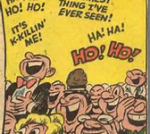 Want revenge? The best way to get back at this person is to get more laughs – which will lead to more bookings.
Want revenge? The best way to get back at this person is to get more laughs – which will lead to more bookings.
So use this as an incentive to focus:
If your hard work and dedication pay off, maybe someday this loud mouth will be parking cars at a comedy club and ripping into his new co-workers while you’re inside headlining. Make it happen.
————————————————————————————-
Dave Schwensen is the author of How To Be A Working Comic: An Insider’s Business Guide To A Career In Stand-Up Comedy, Comedy FAQs And Answers: How The Stand-Up Biz Really Works, and Comedy Workshop: Creating & Writing Comedy Material for Comedians & Humorous Speakers.
For information about these books, comedy workshops and private coaching for comedians and speakers in person, by phone or via Skype visit www.TheComedyBook.com
Copyright 2013 – North Shore Publishing


October 7, 2013
When should you start promoting your comedy or speaking career?
Hey Dave – Last year I was in Boston for the Boston Comedy Festival. It was a 13 hour drive, but it was a good chance for networking. I was talking with another act who said she’s too impatient about getting her comedy career going. I said that my problem is that I’m too patient. After finishing second at another comedy club’s contest and being accepted in Boston, I should be contacting clubs and bookers all over the area instead of waiting until I actually win a contest. Do you agree? – J.G.

I can relate
Hey J.G. – First of all, if I drive 13 hours for anything, I’m going to make sure somebody knows about it. That’s not exactly a Sunday afternoon drive for me, (which is why every seasoned road comic is calling me a wimp right now), so I’d like a little recognition for the achievement. If my kids happened to be in the backseat, I’d expect an award.
How different people react to my successful lengthy trip depends on how they view such an effort. If I told a student driver about my journey, he may look at me as “The Man.” If I walked into a truck stop and made my announcement, I’d probably get more laughs than doing a clean act at a biker bar open mike.
Being accepted to perform at a respected comedy festival and finishing second in a club’s contest are worthy additions to the resume. Each step in your career is a great opportunity for promotion and it’s important to take advantage of it, which is an important subject we’re driving up to next.
But before we head down that road, the question of patience should be answered by common sense. You have to be honest with yourself to know when you’re ready for the next level of your career and not push yourself too fast into a position where you don’t have the experience or material to back it up. In other words, if you’re relatively new to comedy and just breaking into the MC role, it’s wise not to promote yourself to the top clubs as a headliner until you’re ready.

Waitin’ around for
something to happen
What you don’t want to do is sit back and wait for any word-of-mouth to find its way to the bookers. James Bond has a reputation that precedes him, but when finding work in the entertainment business you need to promote yourself. If you have the credits, chances are better that the bookers will find out about it if YOU tell them.
You have to be honest with yourself as a comedian, (or humorous speaker). There are various steps to consider before you actively promote yourself for paying gigs…
Are you ready for paid gigs? You absolutely must have experience and a comedy set or speaker program that has worked successfully during live performances. These can be open mics, benefit shows – whatever. Let’s put it this way. If someone is paying you to do 20 minutes – you’d better have a good 20 minutes or they’ll find someone else who does for the next booking.
———————————————————————————
Sign up now for Dave’s free weekly newsletter and
receive 25% off the Amazon.com list price!
———————————————————————————
Also understand where you fit into the business. Are you an opening act or a headliner? New acts will always be considered openers until they prove themselves worthy of a better position in the show. Think about it. Even Jay Leno was an opener when he started out and worked his way up. He wasn’t given The Tonight Show after a few successful open mic performances.
But let’s say you know that already. You’ve worked hard at writing and performing and you honestly know you’re ready. That’s when it’s time to get the word out to talent bookers, event planners and anyone else who might hire you. That’s when you need to start promoting – and it can be a full time job.

Good news is
worth sharing
Whenever you have an achievement, (accepted to a comedy festival, runner up in a contest, a paid booking in another venue, etc.), make sure the bookers for the clubs where you want to work or the event planners for associations you want to work for KNOW about it. Send them your news via a postcard, an email, add it to your website and resume, and post it on Facebook, LinkedIn and other social networks. You may not get hired right away, but it will add to your name recognition in the future.
As good salesmen say, you need to run a product, (you as a comedian or speaker), past a client, (booker), on the average of SEVEN times before they buy. So when is a good time to start building credits and promoting your comedy career? If you truly believe you’re ready – I’d say right now.
*
 Portions of this article are included as FAQ #31 in Dave’s book, Comedy FAQs And Answers: How The Stand-Up Biz Really Works.
Portions of this article are included as FAQ #31 in Dave’s book, Comedy FAQs And Answers: How The Stand-Up Biz Really Works.
The working comic’s answer in the book is provided by Jackie “The Joke Man” Martling.
————————————————————————————-
Dave Schwensen is the author of How To Be A Working Comic: An Insider’s Business Guide To A Career In Stand-Up Comedy, Comedy FAQs And Answers: How The Stand-Up Biz Really Works, and Comedy Workshop: Creating & Writing Comedy Material for Comedians & Humorous Speakers.
For information about these books, comedy workshops at The Cleveland Improv, and private coaching for comedians and speakers in person, by phone or via Skype visit www.TheComedyBook.com
Copyright 2013 – North Shore Publishing


September 30, 2013
Being influenced vs. copying
Hey Dave – A few weeks ago you wrote an FAQ article about stealing comedy material. I’ve been working on material and continue to search for my comedy voice. Although I want to do some improvising, I want a good amount of material to work off of. Someone said I have a somewhat eccentric and iconoclastic persona and should take advantage of that. Therefore, I’ve thought about using Prof. Irwin Corey and Steven Wright as influences and been writing material similar to theirs, especially since I like it. However, I’m afraid I’m not using them as an influence but just copying them. Is there a thin line between the 2 or just between fishing and standing there doing nothing? – JK
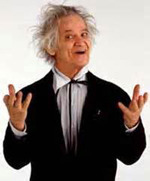
The Professor
Hey JK – I was lucky to have booked Prof. Irwin Corey at the NYC Improv and interviewed Steven Wright for a magazine article. Both are extremely smart and extremely funny. I also know that if I even tried to write like either one, I would be lost and confused. In fact, my brain hurts just thinking about it. But as usual I have a few thoughts about the topic, so instead of standing here doing nothing let’s go fishing for an answer…
Yes – there is a line between being influenced and copying. Ideally it should be a wide one.
As Prof. Corey might say, “Let me explain…”
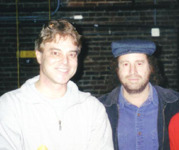
Dave with Steven Wright
I often compare comedy to music. I’ve do this frequently in my workshops, books, and in more than a few previous FAQ articles. Basically, you can’t reinvent the wheel. And when it comes to music, someone somewhere had to hum the first tune. In comedy, someone somewhere made someone laugh for the first time. Musicians and comedians have been building on those firsts ever since.
One of my favorite bands is The Rolling Stones (check out my blog www.theclassicrocker.com for a few references). They’ve influenced countless bands for the past fifty years and are considered by many to be the greatest rock’n roll band in the world. There are many bands that have copied their formula for success, but there is still only one Rolling Stones and their place in music history is written in… well, stone.
But who influenced them? Rock historians can trace Mick Jagger and Keith Richard’s roots back to Muddy Waters, Howlin’ Wolf, Robert Johnson, Chuck Berry, Bo Diddley and many others.
Did they copy? Yeah!
They tried their best by performing a lot of cover songs when they first started out. But it’s not what made them superstars. Mick found his own voice as a singer and Keith found his voice on the guitar. They ended up writing their own material based on the type of music they liked and giving it their own spin based on their talent and personalities.

Mick and Keef
Like the Stones, comedians start by emulating what they like. Keith Richards is not gonna play Bach or Beethoven because he likes Chuck Berry. Based on the way you described your humor in today’s email, I doubt you would consider bringing props on stage like Carrot Top or going manic like Robin Williams. You like Prof. Irwin Corey and Steven Wright so yeah, those guys are going to influence you as a comedian just like Chuck Berry influenced the Stones as musicians.
But the big difference between being a comedian and being a musician, The Rolling Stones can (and often do) play Chuck Berry songs during their concerts. But comedians can’t go on stage and say, “Here’s one from Steven Wright” and do a few of his best jokes.
That’s copying and comedians can’t do that – period. It’s called stealing material. There are some who do – and most of us know who the big-name guilty parties are (read some of the comments my article about stealing material has been receiving on LinkedIn for name-dropping examples). There’s a total lack of respect for these thieves from other comics and industry people, and a lot of us wonder how they can sleep at night. Must be the drugs, but that’s another article…
Being influenced is not the same as stealing. Creative artists, (comedians and musicians to only mention two) don’t reinvent the wheel. They can build on what’s already there. Just like in many original Stones songs you can hear a Chuck Berry riff or Bo Diddley beat in the background, comedians can’t help but be influenced by the type of humor they like.
———————————————————————————
Sign up now for Dave’s free weekly newsletter and
receive 25% off the Amazon.com list price!
———————————————————————————
For example, Carrot Top didn’t invent prop comedy. As little kids many of us can remember holding up two paper plates on the sides of our heads and pretending to be Mickey Mouse. Carrot Top probably did that too, thought it was extremely funny – and built on it.
You as a writer and performer will do the same, but with your own influences.
I think you understand your style of comedy. It’s similar to Prof. Irwin and Steven Wright, but it’s important for you to realize it’s also very different. There’s no way you would have the exact same experiences or live in the exact same environment (city, neighborhood, families, education, jobs, etc.). You have a different life, different relationships and different conversations.
You also have your own personal thoughts about all of these experiences.
That’s what you need to put into your writing and performances – your spin. Don’t think about what Prof. Irwin Corey or Steven Wright would say. But respect that you admire what they do, are influenced to perform comedy in the same style – then say it in your own words.
I remember two comedians I worked with in LA. Sorry, but I won’t name-drop here because one is now an international movie star and the other is an all-time favorite television character. They both admitted to being HUGE fans of Jerry Lewis. They loved every movie and consider him to be the HUGE influence that got them both into the comedy biz.
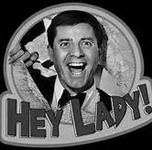 But never in a million years would you see either of them on stage yelling out Lewis’ famous line, “HEY LAAYYYDEEE!” That would be stealing. But I’ve seen both make wild faces and pretend to slip and fall during their stand-up comedy sets. That’s being influenced.
But never in a million years would you see either of them on stage yelling out Lewis’ famous line, “HEY LAAYYYDEEE!” That would be stealing. But I’ve seen both make wild faces and pretend to slip and fall during their stand-up comedy sets. That’s being influenced.
The idea is to use your own mannerisms and personality to deliver your material to an audience. Your not gonna hold two paper plates to your head and hope people laugh. You’re gonna dig deeper and put some thought into why something is funny from your personal point of view and they convey that to an audience.
Everyone is influenced by someone or something. It’s human nature. Again, none of us can invent the wheel because it’s been done – and car companies are still building on it. The same can be said about comedians when it comes to writing and performing comedy material.
But understand what makes you unique from everyone else, (we all are), and explore topics that interest you based on your style of humor. Keep writing and keep performing. Eventually you’ll find your own comedy voice. Then in interviews you’ll be asked who influenced you – and you can tell them. I’ve done that for my books, magazine articles and newspaper columns and believe me; every comedian has someone who inspired them. What makes them successful is when they realize they can’t copy, but can use that influence to build on.
————————————————————————————-
Dave Schwensen is the author of How To Be A Working Comic: An Insider’s Business Guide To A Career In Stand-Up Comedy, Comedy FAQs And Answers: How The Stand-Up Biz Really Works, and Comedy Workshop: Creating & Writing Comedy Material for Comedians & Humorous Speakers.
For information about these books, comedy workshops at The Cleveland Improv, and private coaching for comedians and speakers in person, by phone or via Skype visit www.TheComedyBook.com
Copyright 2013 – North Shore Publishing


September 23, 2013
Singin’ the (comedy) blues
Hey Dave – I have a confession to make and was wondering if this is normal or not and if so, how to deal with it? Is there such a thing as having the blues in comedy? I guess you could call it the Comedy Blues. I mean, I’ve been told “no” before and had terrible sets in the past. But I strongly feel it has made me the keen comedian I am today. But still, if I may… help! - A.
Hey A. – Congratulations. You’re a creative artist. And I think you’re riding what comes with the territory – an emotional roller coaster. It can be a series of BIG ups and downs. That’s why a lot of people can’t deal with a career in the arts – whether it’s comedy, humorous speaking, acting, music, writing or too many others to list.
It’s not easy. If it was don’t you think more people would go for it? You have to admit that standing on stage getting laughs, greeting your fans after a show AND getting paid for it is a pretty cool gig. People in the audience see that and quite a few wish they could do it, but are afraid of rejection or looking foolish. But those who actually take a chance and really go for it don’t seem to have much of a choice. It’s what they have to do.
Okay, this might be more motivational today than instructional, but what the heck. I’m a creative guy so follow me on this one…
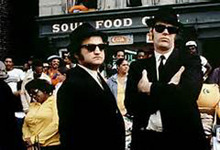
I got the Comedy Blues,
brother.
Let’s relate this to music. A lot of great songs are about HIGHS – while a lot of great songs are about LOWS. Let’s call this latter group blues songs since – (again) what the heck – that’s what they’re called anyway. Basically singin’ the blues is telling listeners nothing worth having or doing seems to come easy. Blues songs are usually about love, money or both – but in our case, let’s relate it to being creative.
To be more specific – going for a career as a comedian or humorous speaker. You want soooo bad to have something good happen, but there are often road blocks. Things never seem to move as fast as you want them to. Yeah, there are big HIGHS to be had – like passing an important audition, getting your first paid gig or winning a contest.
There are also big LOWS when those things don’t happen.
But you know what? Every working comic or speaker will tell you from experience that you’ll hear the word “no” a lot more often than you’ll hear “yes.” Especially in the beginning. It comes with the creative territory.
Do you want to stick around in this crazy biz long enough to (hopefully) have a career? Then you need to develop a thick skin along the way.
Let’s move from music and relate this to sports. The best relief pitchers in baseball are gonna tank (lose) a few games in the last inning during a long season. What makes them great and others basket cases or unemployed are that they can shake off the loss and try to win the next game. It’s a mindset they need to be born with or develop if they want to be successful in a competitive sport.
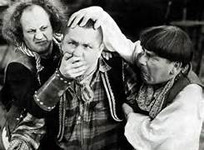
Don’t judge me
I’m an artist!
Being a comedian (we’ll include humorous speakers in this category for now) means you’re a creative artist in a competitive business. You put your creative work and talent on display to be judged by others – such as talent bookers and audiences. Some will like it – others won’t. It’s the nature of the biz. Hopefully your talent and perseverance will eventually lead to more likes than dislikes.
Likes are the highs and dislikes are the lows. The goal is to not get TOO high or TOO low. But it’s not easy when the results are based on your personal talent.
I remember working in NYC and hearing aspiring comics just breaking into the open-mic scene or at their first audition at The Improv saying they plan to have a sitcom within a year. I’m not lying about that – I’m serious and heard it said more than a few times. And I could look at the gang hanging around The NY Improv at that time – comics like Ray Romano, Dave Attell, Brett Butler and Larry David (before they made it) – and knew how hard they had been working at it for years. They didn’t get everything they auditioned for, but they had experienced the highs and the lows. There were no guarantees they would make it – but someone saying “no” wasn’t gonna stop them from continuing.
They were talented (duh!) but hadn’t scored sitcoms within their first year of doing comedy. The new comics at their first open-mics were setting themselves up for disappointment – big lows. They needed to be realistic and understand what to expect:
Comedy HIGHS and Comedy BLUES. It comes with the territory.
And to finish this thought, I don’t remember anyone getting a sitcom within a year of their first open-mic or Improv audition. But I remember the above mentioned comics coming to The Improv every night and paying their dues.
———————————————————————————
Sign up now for Dave’s free weekly newsletter and
receive 25% off the Amazon.com list price!
———————————————————————————
Which leads me to another thought about riding these highs and lows – it’s called paying your dues. Just about everyone (unless you’re a Kardashian) has to go through it. I can think of at least three comics right now who do a bit called “it’s time to thin the herd,” and that’s how it works. Some people can’t take it and drop out of the biz because they can’t take the lows. Others have no choice and continue – with thicker skin.
But it’s important to realize that just continuing is no guarantee of success. Talent, business, connections and sometimes just plain luck are also involved.
Basically, there’s no straight answer to your question. It is what it is. Sometimes it’s good to take a break and regroup. Other times you put your head down and continue if that’s what you must do. For many creative artists there’s no choice in the matter.
Finally, here’s another creative thought…
Consider bringing these feelings (blues) into your comedy. You don’t have to talk about having “comedy blues” (blues singers go for the sad while comics go for the laughs). This may add a little more emotion and real life into your delivery and material. Audiences can always tell when someone is faking it. They can also tell when they’re really going for it and sharing something real about themselves.
Most good comics and speakers have that ability. They talk from experience because they’ve paid their dues by riding the creative roller coaster.
Remember – it’s a creative art. And being a creative artist is not easy.
————————————————————————————-
Dave Schwensen is the author of How To Be A Working Comic: An Insider’s Business Guide To A Career In Stand-Up Comedy, Comedy FAQs And Answers: How The Stand-Up Biz Really Works, and Comedy Workshop: Creating & Writing Comedy Material for Comedians & Humorous Speakers.
For information about these books, comedy workshops at The Cleveland Improv, and private coaching for comedians and speakers in person, by phone or via Skype visit www.TheComedyBook.com
Copyright 2013 – North Shore Publishing


September 16, 2013
Business card – got one?
Hi Dave – I’ve decided to order business cards. I was wondering exactly what information to include. I was thinking phone number, email, and website. I was wondering if there was anything else or if there was a reason not to include my address. – K.S.
Hey K.S. – I’m always surprised at how many self-proclaimed professional comedians or humorous speakers don’t have business cards. Maybe it seems like a relic from the past – like sending a videotape instead of a DVD or YouTube link – but it’s still an important promotional tool.
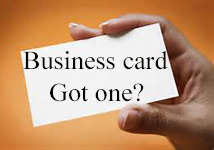 How is anyone going to know you’re out there and available for gigs if you don’t promote yourself? Unless you’re a known headliner, have a Comedy Central special, or a big-time agent pushing for you, you have to make an impression to get noticed. And I’m talking even before you get an audition or showcase to make your impression through a live performance. Your promotion is what gets your foot in the door.
How is anyone going to know you’re out there and available for gigs if you don’t promote yourself? Unless you’re a known headliner, have a Comedy Central special, or a big-time agent pushing for you, you have to make an impression to get noticed. And I’m talking even before you get an audition or showcase to make your impression through a live performance. Your promotion is what gets your foot in the door.
Like I said in my book Comedy FAQs And Answers: They may call it amateur night, but nobody’s looking to hire an amateur.
Memorize that – because it’s true.
I’m not going to get into all the different methods and ways to promote yourself or even talk about auditions since that’s not what your question is about. Let’s talk business cards.
I write a lot about networking and being part of your area’s comedy scene. If you’re out there, you never know who you’re gonna meet that could actually help your career. But are you always prepared to take advantage of it?
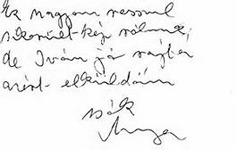
Don’t call us
We’ll call you??
There are comedians who come to The Improv and talk with me about the workshops, how to audition, or the best way to send in a promo video. Then instead of leaving a business card they’ll say, “Let me give you my email address,” (or you can substitute “phone number” or “website” or “Facebook page,” etc…). They expect ME or one of the other managers to write it down – or they ask for a bar napkin or scrap of paper to scribble out the info.
Are they nuts or what?? There’s no way I’d take someone like that seriously. Sorry but in the back of my head I’m thinking, “Amateur…”
Or worse yet, they just tell me their name and say, “I’ll send you a DVD” or “Keep me in mind when the club does a showcase.”
Sorry, but I suck at remembering names. In fact, right now I have this woman bugging me while I’m trying to write this. Oh man… what’s her name? I should remember since I’m married to her…
Get the idea?
When someone like a talent booker or event planner deals with a LOT of comedians and humorous speakers, give them the BEST and EASIEST opportunity to remember who you are and how to get in touch with you. Business cards are not a relic from the past or uncool to hand out. In fact, it’s an important part of doing business – if you’re serious about it.
———————————————————————————
Sign up now for Dave’s free weekly newsletter and
receive 25% off the Amazon.com list price!
(Page 70 – Business Cards!)
———————————————————————————
Another example, just last night a young comedian dropped off a DVD for possible work at the club. Instead of an unreadable name and phone number scribbled in marker on the DVD (which I see all too often), he had a professional looking business card in the plastic cover. That won’t mean he’ll get hired or even get a showcase – talent and experience will determine that – but it certainly gives the image of being serious about his career.
Remember – nobody wants to hire an amateur.
So to finally answer your question, a business card should include your name, what you do (comedian and/or speaker, etc…), the best way(s) to contact you, and where potential clients can see your video and promo material:
Phone
Website
Facebook, LinkedIn or other (website is more professional)
A good idea is to design your business card to stand out from the competition. A photo of yourself or a logo will work. But if you (or a friend) have experience doing this, the idea is to have a business card that’s so unique and interesting and basically sooo cool - the people you give it to will actually keep it, rather than eventually tossing it away or losing it in a drawer.
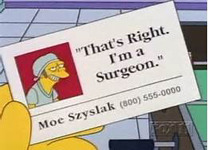 I know that’s tough to do – and I’m still trying to come up with a design that fits my definition of sooo cool. But it’s always a goal.
I know that’s tough to do – and I’m still trying to come up with a design that fits my definition of sooo cool. But it’s always a goal.
If nothing else, go on a website that offers inexpensive business cards (there are plenty – but for a suggestion try VistaPrint) design one or two with different looks, and never leave home without them. You can always change or update them later (cuz they’re inexpensive and sometimes free), but if you’re serious about this business you have to take promoting and networking seriously.
When you make a contact a business card makes it clear who you are and just as important, how they can get in touch with you. There’s nothing amateur about that.
Word of warning: Never put your address on your business card or any promotional material. You don’t know who will wind up with this stuff and the last thing you need is some wacko stalking you, (I’ve known this to happen – especially with female comedians and speakers).
If you feel potential clients should know where you’re located for hiring purposes, just use the largest city near you. I say I’m in Cleveland – but actually don’t live all that close to the city. It’s nearby enough to get there in a hurry if someone calls and wants to hire me for a last-minute area speaking gig. That’s a good enough reason for me to say I live in Cleveland, (because it’s certainly not the sports teams!).
Amateurish? Not when a business card can make it easy to find you and hire you. It’s called being a professional.
————————————————————————————-
Dave Schwensen is the author of How To Be A Working Comic: An Insider’s Business Guide To A Career In Stand-Up Comedy, Comedy FAQs And Answers: How The Stand-Up Biz Really Works, and Comedy Workshop: Creating & Writing Comedy Material for Comedians & Humorous Speakers.
For information about these books, comedy workshops at The Cleveland Improv, and private coaching for comedians and speakers in person, by phone or via Skype visit www.TheComedyBook.com
Copyright 2013 – North Shore Publishing


September 9, 2013
The Comedy Police
Hey Dave – I was at an open-mic last week. A comic went on stage and “called out” another comic who had gone on before him for stealing jokes. He did this from the stage. But afterwards he couldn’t prove it and no one else could remember hearing the jokes anywhere else before. We think he was wrong and he handled it wrong. Any thoughts? – D
Hey D – I always have thoughts. And when they’re thoughts about comics or speakers stealing material, they’re never good thoughts.
What a jerk.
Wait… let me rethink. We might have two jerks here. Allow me to think out loud – or at least in LOUD writing.
JERK #1:
This honor goes to the comic who “called out” the other one from the stage. First of all, as he admitted later, he had no proof for doing this. Maybe he thought it was funny to be “on the edge” – which can sometimes be very funny. But in the situation you described, it’s not funny when it’s at the expense of someone who is also using an open-mic to become a better comic (the purpose of doing these).
Of course this is assuming the first comic actually didn’t steal any material.
The comic who accused the other should’ve talked with him off stage and not dissed him in front of an audience. A little courtesy is due, unless he’s known for stealing material. In that case I’d say go ahead and trash him. I’m sure most comics will agree.
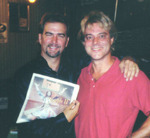
Bill Engvall with Dave
NOT dance partners
But without proof and only working off a hunch, the more professional way is to take that person aside and talk with him – privately – about it. This is a topic in my book Comedy FAQs And Answers with Bill Engvall who, by the way, is joining this season’s cast of Dancing With The Stars. I’m looking forward to that (“Here’s your sign!”)
Anyway, Bill talked about the comedy police. Basically, when you think a comic is stealing material, mention it to him – off stage. He may not even realize he’s doing it and has actually written a joke too similar to one someone else is doing. I’ve seen it happen. To explain…
Two comedians – one in NYC and the other in LA – wrote the same joke. They didn’t know each other and as far as I know from talking with both, had never even played the same clubs. But the one in LA got a spot on A&E’s An Evening at the Improv and did the joke. I know because I was standing off camera at the time.
After it aired I was talking to the other comic in NYC and he immediately told me he had to stop doing the joke. The one who did it on TV was now the owner because of the audience exposure. He never felt the other guy stole from him – because they weren’t in the same comedy circle. He felt bad because the joke was based on his appearance, but then again it worked that way for the other comic also.
The bottom line was that he understood how the business works. He could never do that joke again without a member of the comedy police calling him out on it.
The same thing happens in music. Someone will write a song and find out from the music police it’s already been written. That’s why the late Marvin Gaye’s estate is suing Robin Thicke over Blurred Lines and Madonna’s ticked off at Lady Gaga for Applause. They may (plagiarism) or may not (coincidence) have realized the songs were too similar when they were writing them.
———————————————————————————
Sign up now for Dave’s free weekly newsletter and
receive 25% off the Amazon.com list price!
———————————————————————————
That’s why Paul McCartney played his tune Scrambled Eggs for everyone he could for months before he was sure he hadn’t unconsciously copied another song. He claims it came to him in a dream, which meant it came almost too easy to be an original. But it was – and went on to become Yesterday.
So it’s possible a comedian might be doing material too similar to someone else and not realize it. The best way to handle it is without grandstanding in front of an audience. Tell him after the show and give proof. If he continues – then everyone can trash him. Just like the following…
JERK #2:
If a comic or speaker is stealing material and is caught, a wise move is not to do it again and to start writing. Otherwise they risk suffering the consequences. Here’s what I mean…
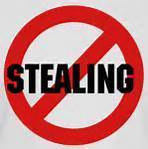
Is this really necessary?
There was an open-mic comic in NYC when I was starting out. He was a nice guy and it didn’t hurt his standing with us that he ran a popular open-mic where we could get stage time.
He wasn’t any better than the rest of us starting out. We were just creating material and trying to figure out how to deliver it on stage. Every once in awhile someone would come up with a good joke or bit – which would become a keeper in their set.
This guy was also developing his act, but every few weeks he’d travel to Florida where he told us he was a headliner. We knew his family lived there, but always said he went for work – and visiting his family just meant he had a place to stay.
The headliner part never seemed right. If that was true, the Florida comedy scene must really be hurting and we should all move there for headlining gigs. Okay, maybe he had friends in high places or was delusional, but we just couldn’t figure out which.
Then a real headliner from NYC told us what was going on. He had just played a club in Florida and our “friend” was opening for him. He was doing the best bits he had stolen from the open-mic comics playing his club.
Say what?!
The reaction was worse than getting “called out” from on stage. Let’s just say no one would play his open-mic anymore (he lost it) and no one who ran an open-mic would give him stage time. Word spread around the NYC comedy scene and I’m pretty sure he moved back to Florida to pursue his rising career. Actually I heard he was parking cars, but I have no proof to call him out on that.
But I do have this proof…
A few years later I was the talent coordinator at The Improv in LA. He called – out of the blue – and tried to play the friend card with me for a showcase. To make a short story even shorter – he didn’t get the showcase.
Chalk another one up for the comedy police.
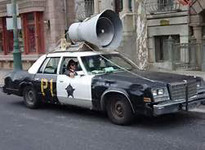
Hack Patrol
You’re busted!
So I guess to answer your question, yeah – I think it was wrong for the guy (jerk #1) to call the other comic out from on stage. If he really thought there was an issue of stealing, he should’ve have talked with him in private. The other comic may not even have realized it, but if there’s proof he should stop.
If he did steal, this warning from a member of the comedy police should convince him not to do it again.
But if it’s obvious this comic is stealing and continues to do so, don’t let it take over your set at an open-mic (where you should be working on YOUR material). Comics are not dumb people and a lot I know are students of comedy. They’ll find out soon enough, the word will spread and you’ll see what happens.
Odds are good he’ll be parking cars somewhere before he ever has a chance to “own” these jokes on television.
———————————————————————————
Dave’s comedy workshop at The Cleveland Improv beginning Saturday, September 14, 2013 is SOLD-OUT. For details about future workshops visit
————————————————————————————-
Dave Schwensen is the author of How To Be A Working Comic: An Insider’s Business Guide To A Career In Stand-Up Comedy, Comedy FAQs And Answers: How The Stand-Up Biz Really Works, and Comedy Workshop: Creating & Writing Comedy Material for Comedians & Humorous Speakers.
For information about these books, comedy workshops at The Cleveland Improv, and private coaching for comedians and speakers in person, by phone or via Skype visit www.TheComedyBook.com
Copyright 2013 – North Shore Publishing


September 2, 2013
How long is a good promo video?
Hey Dave – Last week you sent us information about Comedy Central’s UP Next contest. They want to see a video. How long is a good promotional video? – (Edited from a bunch of emails I received this week)
That’s not only a good question, but also an important one. Videos have made life a lot easier not only for comedians and speakers, but also talent bookers. In the “old days” everyone had to rely on live showcases or trusting someone’s recommendation. Now bookers can watch showcases simply by going online or watching a DVD.
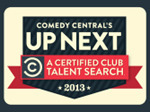 For those of you who followed up on the UP Next contest, you know that’s what they’re doing. You submit your promo video either online or DVD and the powers that be will watch it. If they like your set, you’ll get a call. If not…
For those of you who followed up on the UP Next contest, you know that’s what they’re doing. You submit your promo video either online or DVD and the powers that be will watch it. If they like your set, you’ll get a call. If not…
I’m asked A LOT about how long a good promo video should be. In fact, that was a topic of an FAQ and Answer about a year ago. And like I said above, it’s not only a good question – it’s also an IMPORTANT question. So for those reasons, here’s the answer once again…
Hey Dave – I’m real serious about doing stand-up comedy and I wanted some info on making my audition tape. How long should it be? Are bookers looking for something specific? – B.T.
Hey B.T. – The future of comedy relies a lot on the past. A dynamic, attention-grabbing and (most of all) FUNNY audition tape. BUT we don’t want to live TOO much in the past, so let’s start talking about this in terms of online videos and DVDs.
I don’t know anyone who’s using “tape” anymore – but we still call them “videos.”
Actually, that’s – just a technicality. But I want to make sure we’re using same terms and are on the same page… uh, “screen” here in 2013.
When I talk about relying on the past, I’m talking about how long your video should be. That hasn’t changed since I wrote the first edition of How To Be A Working Comic and quoted comedian Bobby Collins, who was talking about video “tape” at that time. It should be 3 to 7 minutes long, with 5 to 7 minutes being the most common. That gives talent bookers a “taste” (Bobby’s term) of what you do on stage.
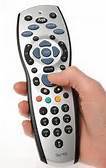 Most talent bookers are pretty busy. You wouldn’t believe how many videos they’re asked to view every day. Since there are only so many minutes in a day – they can’t sit around and watch an hour, half hour or even 20 minutes of performance footage from each comedian. That’s why most only watch the beginning, hit the fast forward button and stop at random places.
Most talent bookers are pretty busy. You wouldn’t believe how many videos they’re asked to view every day. Since there are only so many minutes in a day – they can’t sit around and watch an hour, half hour or even 20 minutes of performance footage from each comedian. That’s why most only watch the beginning, hit the fast forward button and stop at random places.
When I booked the TV show A&E’s An Evening At The Improv, I would watch anywhere from 20 to 30 videos at one sitting.
No lie.
I couldn’t take (because of time – not interest) more than 5 minutes with each one. So the comedian had to come on strong from the beginning and prove they were already a working comic. If not, then I’d stop the video and move on to the next one.
———————————————————————————
Sign up now for Dave’s free weekly newsletter and
receive 25% off the Amazon.com list price!
———————————————————————————
Another thing I’ve always said is that a good talent booker will know 30 seconds into a comedian’s video submission if he wants to hire that comedian, ask for a live showcase, or keep looking for someone else. Experience and talent will show (or should) right from the beginning of the set. You can try to fake it by editing or packing the audience with supportive friends and family, but people in the biz can usually tell right away.
Now, if they watch 3 to 7 minutes and are interested but not convinced (sold) on hiring, they can contact the comedian and request more. That’s when you can send something longer, (usually 15 to 20 minutes).
I once worked with a club booker who (seriously) said he wanted to see a full one hour video before he would hire an act. I thought that was a bit extreme, but if that’s the way he does business… well, it’s his club and it’s his time. I never met another booker who had that much time to watch an hour long video from each comedian.
It also depends what market you want to get into.
I’m talking mainly about clubs and television with the above advice. If you want to work in the corporate market as a comedian or as a humorous speaker, your video will be much different. That should be a production – rather than just an example of your live performance.
This means corporate videos can be edited showing not only various segments of your act or presentation, but also audience comments, your credits scrolling across the screen – or any other techniques that make the comedian or speaker look professional and in demand.
Again, short and dynamic is best. The corporate videos I’ve been sent or have edited for myself and others are always five to seven minutes in length.
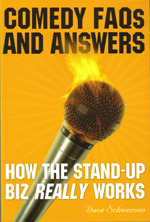 The college market also plays out differently. When you’re involved in NACA and APCA, the college booking organizations I talk about in the book Comedy FAQs And Answers, they only want 3 minute videos. BUT the catch is if the college students who are involved in Student Activities (similar to talent bookers) like that 3 minutes and want to see more, you should have at least two additional 3 minute segments on the same DVD or online submission so they can continue to watch until they:
The college market also plays out differently. When you’re involved in NACA and APCA, the college booking organizations I talk about in the book Comedy FAQs And Answers, they only want 3 minute videos. BUT the catch is if the college students who are involved in Student Activities (similar to talent bookers) like that 3 minutes and want to see more, you should have at least two additional 3 minute segments on the same DVD or online submission so they can continue to watch until they:
Give you a live showcase, (explained in the book).
Keep you in mind as a maybe.
Move on to the next comedian.
And finally, what’s different now than in the days of using video “tape” is the method of delivery. Everyone now can watch online or via DVD. The last holdout was the college market (believe it or not – you would think they’d be the most progressive) that still wanted video tapes until just a few years ago.
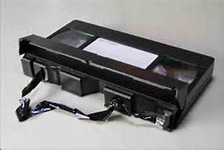 There was also an agent I used to work with – not that long ago – who insisted he only wanted video tapes (we’re talkin’ VHS tapes here, folks!). I stopped working with him. If he can’t stay current on how the business is done, then I doubt he would be doing much business. I’ve heard through the grapevine that he finally has an email address, so maybe he’s been reading this newsletter and finally getting it…
There was also an agent I used to work with – not that long ago – who insisted he only wanted video tapes (we’re talkin’ VHS tapes here, folks!). I stopped working with him. If he can’t stay current on how the business is done, then I doubt he would be doing much business. I’ve heard through the grapevine that he finally has an email address, so maybe he’s been reading this newsletter and finally getting it…
In 2013, everyone in the business has the technology to watch promotional video online. If not, then they’re in the wrong business.
—————————————————————————————————
The Kickstarter campaign for my next book, The Beatles At Shea Stadium is ending today – Wednesday September 3, 2013 at 10:00 pm EST
We’ve almost reached out goal and your HELP! can make it happen!
Follow THIS LINK to find out more about the project AND the rewards.
Thanks and as always… Keep Laughing!! Dave
—————————————————————————————————
YouTube is the most popular, but I know there are also other sites that can allow bookers to watch your video immediately. The key is to have it available to them on your website or Facebook page. And from what I’ve heard, MySpace was pretty much a thing of the past – but seems to be making a comeback, so it wouldn’t hurt to have something on there also.
* Last bit of advice about this.
I recently talked to a booker who said he expects comedians to have a website. It’s more professional. He told me he won’t even go on Facebook to watch. If the comedian doesn’t have a website, then he feels that comedian is not professional enough to work in his club.
I’m just passing that thought along because I know you’re interested…
———————————————————————————
Dave’s next comedy workshop starts at The Cleveland Improv on Saturday, September 14, 2013. Includes a performance at The Improv on Wednesday, October 2nd at 7:30 pm. For details visit www.TheComedyBook.com
————————————————————————————-
Dave Schwensen is the author of How To Be A Working Comic: An Insider’s Business Guide To A Career In Stand-Up Comedy, Comedy FAQs And Answers: How The Stand-Up Biz Really Works, and Comedy Workshop: Creating & Writing Comedy Material for Comedians & Humorous Speakers.
For information about these books, comedy workshops at The Cleveland Improv, and private coaching for comedians and speakers in person, by phone or via Skype visit www.TheComedyBook.com
Copyright 2013 – North Shore Publishing


August 25, 2013
Part 2: Booking holiday parties – the $$
Hey Dave – Last week you wrote about booking gigs for holiday parties. Good tips, like planning your promo, networking, and working clean. But you left us hanging about the money and how comics can charge more for holiday gigs. You said you’d cover that subject this week. So what’s the pay-off, you handsome devil? – Dave
Hey Handsome Devil Wannabe…
Okay, I’ll stop the BS. In case you haven’t figured it out, I wrote the above question. I could’ve just continued from where we left off last week by announcing “Part 2″ in bold, italicized CAPS, but what good is it to call these articles FAQs and Answers if there’s no Q kicking it off?
Guess I’m a stickler for sticking with the format. So with that said…
PART 2:
Most experienced comedians will raise their corporate performing fees for holiday parties. Notice I said experienced. Rookie, open-mic comics (though I love you guys!) should not get into the private party (holiday gigs) market until you have an act that is audience-proven and worth the money businesses will pay for entertainment.
 In other words – like a good business – you want satisfied customers. Word gets out that you were an asset (business term) to the party, it could lead to more work. If you do a crash and burn, take the money and run (hack comic term) performance, that word could also get out – and your next holiday gig might be working for the caterer.
In other words – like a good business – you want satisfied customers. Word gets out that you were an asset (business term) to the party, it could lead to more work. If you do a crash and burn, take the money and run (hack comic term) performance, that word could also get out – and your next holiday gig might be working for the caterer.
Know what I mean?
Yes, there are (as always) exceptions. For example, your aunt’s boyfriend offers you 20 bucks to say something funny at his retirement roast. If you don’t live up to the (headline) billing your loving aunt was probably using to influence this decision, you might just get a few dirty looks from the boyfriend and the other witnesses. Do the same (bomb) at a big-money corporate holiday event and you might have a hard time getting paid.
As a booker I’ve felt the wrath of clients who thought a comic was so bad that they refused to pay – or have demanded a refund. Do you think I’d work with that comic again? No way. I’ve also known a few contacts in the business world that have actually picked up the phone and called me, other booking agents, businesses, etc… and warned them not to use a certain comic for ANYTHING.
Believe me, bad reviews seem to travel a lot faster in his biz than good reviews.
So – let’s put it this way. If you’re just starting out as a comic and working your way through the open-mic circuit, chances are you’re not going to be headlining The Improv next weekend for big bucks. Use this same business sense when it comes to booking holiday parties. This is also true for humorous speakers still doing free gigs (your open-mic circuit) to put your presentation together.
Yeah, there are very small parties with very small budgets that experienced comedians wouldn’t even consider doing. Let’s say in the $200 or less range. If you’ve had success doing 20 CLEAN (G-rated) minutes and can throw in a few holiday references, then partner with another comic who can do the same. Offer the potential client a 40 minute two-comic holiday comedy show and split the money with your new partner.
Seriously. It will give you experience, corporate credits for your resume – and gas money.
You wanna break into the market? Be smart about it. Don’t go in thinking you can stretch out your current 15 minutes of material by working the crowd for 40 minutes and get away with it. That’s why experienced headliners and strong features can clean up doing holiday parties. They already have the material and the stage experience.
Which brings us back to the beginning? You remember, right after that handsome devil reference…
———————————————————————————
Sign up now for Dave’s free weekly newsletter and
receive 25% off the Amazon.com list price!
———————————————————————————
Most experienced comedians will raise their performing fees for corporate holiday parties.
The holiday season is a short time of year to make a lot of money. Think about it. You may have to start promoting months in advance, but the season only lasts a few weeks in December. Parties can (and do) happen every night of the week, probably starting close to December 1st and going until Christmas Eve, but you gotta realize there are only a few Friday and Saturday nights in those weeks when most of the parties take place.
 The boss (the client who will hire you) will be spending big bucks on the party room, (restaurant, hotel, conference center – wherever), and also on the food and booze. If he’s got half a heart and seasonal cheer, he might also be springing for bonus checks and even possibly gifts for all his employees.
The boss (the client who will hire you) will be spending big bucks on the party room, (restaurant, hotel, conference center – wherever), and also on the food and booze. If he’s got half a heart and seasonal cheer, he might also be springing for bonus checks and even possibly gifts for all his employees.
So relying on what we know about today’s economy and that odds aren’t good Donald Trump is funding this holiday bash, a good guess is if the boss is hiring a comedian – chances are he won’t also be hiring a band, deejay, hypnotist, balloon artist, or Carrot Top. For a lot of companies, it’s not in the annual holiday party budget anymore.
So if the boss goes with hiring a comedian instead of another option – that comedian is the main entertainment attraction for the annual holiday party. This is the party everyone in the company will be talking about until next year’s annual holiday party.
 If the comedian is a hack, the party would be a major bust, and the boss would have to live with that reputation for an entire year. No one will remember what finger sandwiches were served. But if they had to sit in a room and listen to a comic not make them laugh for almost an hour… well, that’s memorable.
If the comedian is a hack, the party would be a major bust, and the boss would have to live with that reputation for an entire year. No one will remember what finger sandwiches were served. But if they had to sit in a room and listen to a comic not make them laugh for almost an hour… well, that’s memorable.
Therefore, the boss needs to hire a good, experienced comic. And if the comedian has the experience to make the party a huge success, then he deserves to be paid well for the effort (and should know it).
Here’s another way to look at this. A hypothetical conversation – from the comedian’s point of view:
“My fee for your secretary’s retirement banquet is $500. I’m really not busy that evening anyway and it beats sitting home waiting for the phone to ring. BUT if you want me to perform at your Christmas party, it’ll cost you $750. Why? (As the client is coughing and choking). Because four other businesses I’ve contacted are also having their parties that same night and I’m going with the best offer.”
With a good business plan, luck, ability to schmooze, and geographically desirable locations, three or four of those holiday business parties can be booked for the same night at staggered times. That’s $750, (or whatever fee you charge), times four… equals… well, the total is staggering compared to what you might earn for two shows that same night in a comedy club – which is why comedians love holiday parties.
But once again, a major word of warning (after this commercial break):
—————————————————————————————————
The Kickstarter campaign for my next book, The Beatles At Shea Stadium has launched and is running until September 3, 2013!
Follow THIS LINK to watch the video, find out more about the project AND the rewards if you’d like to help me get this published.
Thanks and as always… Keep Laughing!! Dave
—————————————————————————————————
This may all sound like easy money and temp you to jump into the holiday party pool headfirst (with no sunblock – a reference to last week’s Part 1 if you’ve paid attention). But keep in mind what I said earlier. The entertainment, (comedian or humorous speaker), can make the party a success or a bust. You need experience and a proven act – and some holiday references and jokes wouldn’t hurt. And the material must be CLEAN. No X-rated or R-rated stuff for all the reasons mentioned in Part 1 of this article. The only exception would be if this was a request from the client and worked out in advance with his approval.
Also never forget – experience counts. Just like there are no short cuts from playing an open-mic one weekend to headlining at The Improv the next. It doesn’t happen unless your aunt’s boyfriend runs the club and is pretty secure in his job.
If a client is willing to pay big bucks, you have to be willing to put in the work first. If you have the stage experience and proven material, then go for it. If not, start writing now and getting on stage as often as possible with an eye on next year. As I mentioned last week in Part 1, the promotion process for performers starts right about now. You know, while we’re still thinking more about sunblock than Santa Claus…
———————————————————————————
Dave’s next comedy workshop starts at The Cleveland Improv on Saturday, September 14, 2013. Includes a performance at The Improv on Wednesday, October 2nd at 7:30 pm. For details visit www.TheComedyBook.com
————————————————————————————-
Dave Schwensen is the author of How To Be A Working Comic: An Insider’s Business Guide To A Career In Stand-Up Comedy, Comedy FAQs And Answers: How The Stand-Up Biz Really Works, and Comedy Workshop: Creating & Writing Comedy Material for Comedians & Humorous Speakers.
For information about these books, comedy workshops at The Cleveland Improv, and private coaching for comedians and speakers in person, by phone or via Skype visit www.TheComedyBook.com
Copyright 2013 – North Shore Publishing


August 20, 2013
Booking Holiday and Christmas Parties
Hey Dave – What’s the deal with doing Christmas parties? I know some comics who booked a few last year and made good money. – T.R.
 Hey T.R. – Christmas / holiday parties are big business in the comedy biz. Corporate and humorous speakers (sometimes one in the same) can also score big during the festive season, but I don’t consider their bookings as seasonal as comedians in this market.
Hey T.R. – Christmas / holiday parties are big business in the comedy biz. Corporate and humorous speakers (sometimes one in the same) can also score big during the festive season, but I don’t consider their bookings as seasonal as comedians in this market.
Why? Because comedians are considered entertainment and holiday parties usually want entertainment. Speakers with a message – whether informative, entertaining or both – can often find gigs at meetings and conferences year-round. For instance, I just spoke at a conference last week. With keynotes being delivered during breakfast, lunch and dinner meetings, and various workshops running concurrently over two days at this huge resort, there had to be at least 50 speakers involved.
I didn’t see any comedians…

Who’s the boss?
So with that personal observation in mind, we’ll focus this FAQ and Answer on comedians and entertainers looking to book holiday parties. But I’m also pretty sure humorous speakers will be interested in some of this stuff.
The time to get in on this action is now.
We’re hitting the end of summer and a lot of these holiday bashes are already in the planning stages. In fact, I’ve already gotten my first call for this holiday season, so the clock is ticking…
Most of these holiday parties are planned way in advance because the bosses (employers) have to rent party rooms or restaurants in advance for this once a year company-paid blow-out. They also know somewhere in the back of their minds the approximate date when they have to cough up holiday bonus checks for their employees – so that also goes into factoring when these parties will occur.
Once the party date has been confirmed, it’s circled on every employee’s calendar and they’re expecting the boss to show them a good time. Of course the smart employees won’t have too much of a good time, but for those who cut loose a little too much…

Dave with the great
Phyllis Diller
As the great Phyllis Diller once said:
“I hate Christmas parties. You always have to wake up the next day and start looking for a new job.”
Booking holiday parties is similar to working in the corporate market. You may imagine employees overindulging in the eggnog and walking around wearing Santa hats with mistletoe pinned to the white fluffy ball at the top, but the boss is still in charge of the toy factory. With lawsuits about sexual harassment, discrimination, mental anguish, and whatever other reasons and insults that could cause the company to continue paying a future former employee for not working at the company anymore (and their lawyer fees) the boss is not gonna take any chances. The only exceptions I can think of might be if they’re a strip club or a construction crew – and then they’ll most likely wind up having their parties together.
Just kidding!! Sometimes I think I’m funny…

Your audience
What I’m trying to say is that except for the rare exception, company holiday parties have turned into family style events. There may or may not be kids involved, but there’s usually an office prude or uptight spouse keeping an eye on everything. And the best way to avoid hassles is to stay politically correct. If you want to be offended by a comedian, go to a comedy club. If you want holiday laughs where no one has to wake up the next day and look for another job, hire a comedian who works clean.
Speaking of clean, a lot of the comedians who are cleaning-up dollar-wise with holiday parties start their booking efforts in late summer and early fall. Seriously. I can go into my files as a booking agent and see contract signing dates in August and September for Christmas parties. The performances were signed, sealed and deposits were paid while I was still trying to get my kids to put on sun block before they’d go outside.
—————————————————————————————————
And now for something completely different…
The Kickstarter campaign for my next book, The Beatles At Shea Stadium has launched and is running until September 3, 2013!
Follow THIS LINK to watch the video, find out more about the project AND the rewards if you’d like to help me get this published.
Thanks and as always… Keep Laughing!! Dave
—————————————————————————————————
The process of promoting yourself for these shows is the same as I’ve written about for the corporate market. Only now you want to aim it for the Christmas season. Put it right on your emails and postcards, and mention it if you’re calling businesses:
You are available for office holiday parties – and work clean.
Your promotions can start in late August or early September. Do a mailing or emailing to your regular contact list, (you should have one if you’ve been reading these articles) and then follow up with phone calls. If you don’t have the proper contact person, ask who is in charge of the company Christmas / Holiday party. That person is probably looking just as hard for entertainment as you are for gigs. With the right promotion and networking skills, (again – business techniques you should already have if you’re been reading these articles), you can make their life easier by hiring you as the entertainment. This will give them more time to choose the table ornaments and who should not be seated next to each other to avoid company in-fighting.
Again, it’s all about finding leads, networking and promoting – which are business techniques I talk about in my book How To Be A Working Comic and these newsletters.

A little extreme…
I know comedians and speakers who have promo photos taken wearing Santa suits or with other holiday themes. Their websites and online networking are advertising their skills at entertaining for holiday parties. In the entertainment biz, the holiday season has already started.
But there’s more to this than just getting the gigs – it’s also about getting paid. And yes, the rumors are true. Entertainers can charge more during the holiday season than any other time of the year. But I’m going to ask you to hold that important thought for awhile. We’ll get to the part we’re all interested in – the money – next week. See’ya then!
———————————————————————————
Sign up now for Dave’s free weekly newsletter and
receive 25% off the Amazon.com list price!
———————————————————————————
Dave’s next comedy workshop starts at The Cleveland Improv on Saturday, September 14, 2013. Includes a performance at The Improv on Wednesday, October 3rd at 7:30 pm. For details visit www.TheComedyBook.com
————————————————————————————-
Dave Schwensen is the author of How To Be A Working Comic: An Insider’s Business Guide To A Career In Stand-Up Comedy, Comedy FAQs And Answers: How The Stand-Up Biz Really Works, and Comedy Workshop: Creating & Writing Comedy Material for Comedians & Humorous Speakers.
For information about these books, comedy workshops at The Cleveland Improv, and private coaching for comedians and speakers in person, by phone or via Skype visit www.TheComedyBook.com
Copyright 2013 – North Shore Publishing



